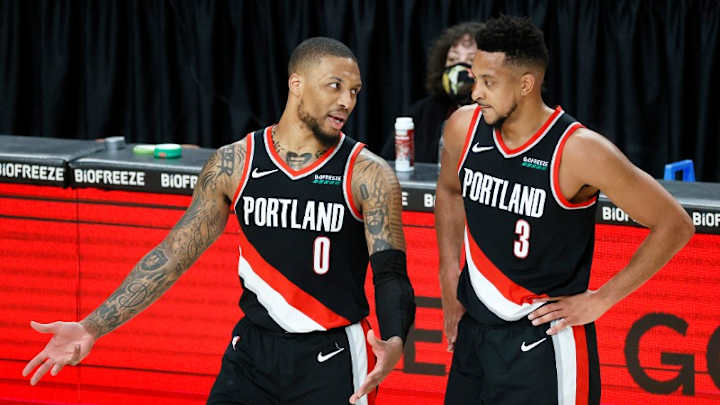Portland's Transition Defense Is Growing More And More Porous

The Trail Blazers' defensive woes are sweeping.
They can't contain the ball on the perimeter. They struggle rotating with speed and precision behind the point of attack. They're prone to bouts of apathy. They lack even mediocre rim-protection without Jusuf Nurkic and Zach Collins. They're still learning how to best communicate with each other. They get easily confused toggling between multiple schemes mid-game. Their overall defensive personnel is simply substandard.
But before the All-Star break, Portland was able to overcome those myriad issues to at least manage something close to average transition defense. The Blazers' defensive rating in transition was 125.8 prior to All-Star weekend, per Cleaning the Glass, the 15th-best mark in basketball.
Portland has taken a significant step back in that category since returning from its week-long vacation, though, a reality supported by both the numbers and the eye test. The Blazers have allowed a whopping 150.0 points per 100 transition plays post All-Star, per Cleaning the Glass, 29th-most in the league. Only the Denver Nuggets have been worse.
Five games is a tiny sample size, obviously, and superstars like James Harden, Luka Doncic and Zion Williamson present unique challenges for any defense switching ends. Reintegrating C.J. McCollum has certainly played a factor in Portland's ever-porous transition defense, too. You don't just go from rehabbing and watching from the sidelines for two months to playing live NBA basketball without undergoing an inevitable re-acclimation process.
But the rest of the Blazers don't have that excuse. All too often of late they've been slow to get back and casual matching up when the ball changes sides, giving the opposition easy score after easy score.
Those are inexcusable mistakes, and so are more nuanced ones like Portland failing to balance the floor when a shot goes up or having too many players crash the offensive glass.
The Blazers know full well they're climbing uphill to manage just league-average overall defense. Doing so will prove impossible unless they learn to consistently pick low-hanging fruit defensively, and there's not many aspects in basketball a defense has more control over than getting back in transition and ensuring it's matched up. Maybe Portland improves in that over the season's remainder, but the clock is ticking.
After the Brooklyn Nets dropped a 119.6 offensive rating on Tuesday night despite playing without Kyrie Irving, Kevin Durant and Landry Shamet, Robert Covington stressed a postgame refrain that's become all too familiar.
"Just be in our rotation a little bit quicker, and being on top of things a lot faster," he said of his team's necessary defensive improvements. "So, it's just that split second that plays a difference in it. Like I said, we just gotta be more aggressive."
The Blazers' next opportunity to make good on that long hollow rhetoric comes Thursday against the Miami Heat.
